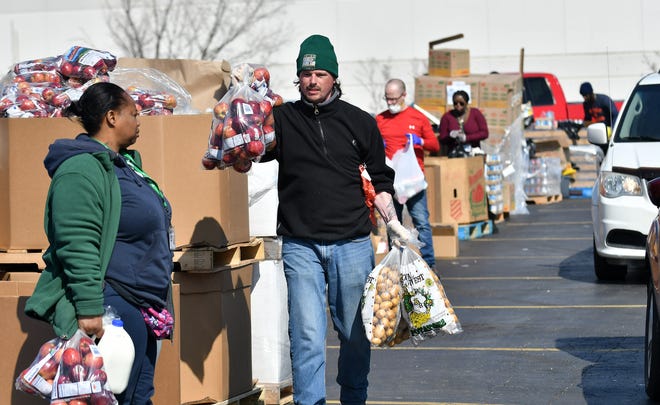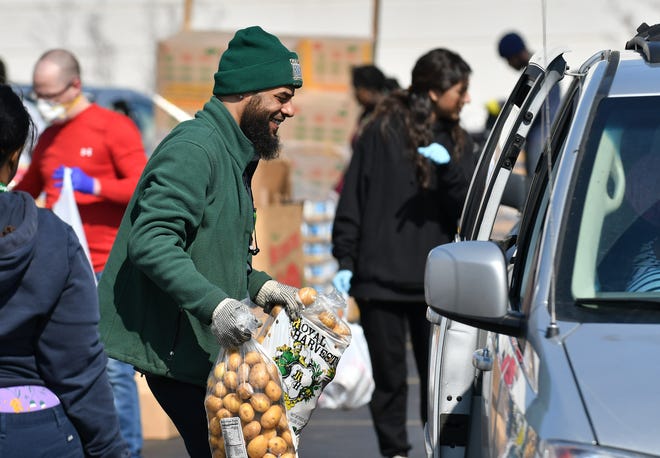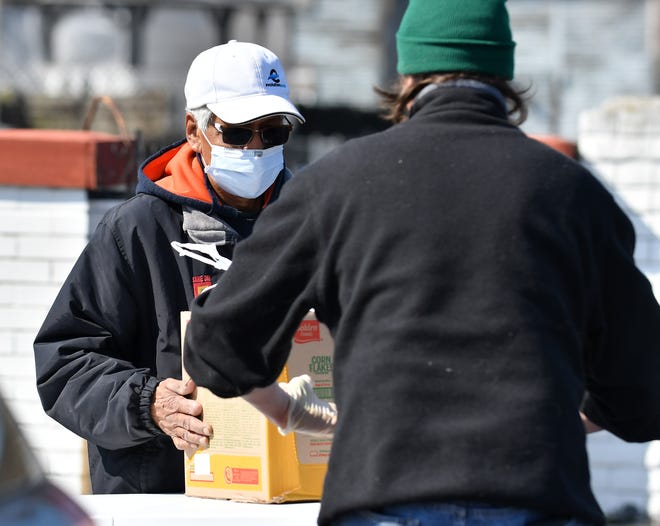Detroiters face higher risk of severe outcomes in coronavirus outbreak
Detroit — The growth in coronavirus cases in Detroit has made Wayne County an emerging hot spot for the disease, a grave turn for a population that is more vulnerable to severe cases and even death.
Confirmed cases rose to 851 among Detroiters on Thursday, 11 times the number recorded seven days ago. Wayne County now ranks just behind Washington's King County and among the nation's 10 most infected.

U.S. coronavirus task force coordinator Deborah Birx for the first time on Thursday identified Wayne County as an area of focus.
"We are concerned about certain counties that look like they’re having a more rapid increase — if you look at Wayne County in Michigan and you look at Cook County and Chicago,” Birx said.
The city's high levels of poverty and pre-existing health conditions make those who acquire the disease more susceptible to the most acute cases of COVID-19, health officials said.

"Issues of poverty, lack of access to food, transportation and secure housing are being severely exacerbated now," Michigan Chief Medical Executive Dr. Joneigh Khaldun told The Detroit News. "I’ve heard stories of people spending their last dollar to take a bus to a store to get food or essential goods, only to find that the shelf is empty.
"We also know a lot of families depend on the food being served in schools, and now they are not sure how their children will get fed."
Gov. Gretchen Whitmer ordered Michigan residents to shelter-in-place until April 13 as the disease rapidly spread. The growth rate in Detroit outpaces the rest of the state, where 2,856 cumulative cases through Thursday were eight times those recorded a week ago.
Detroit has a higher percentage of African Americans and higher poverty levels than any other large U.S. city.
"There is no question that the COVID-19 outbreak is having a more significant impact on marginalized and poorer communities, particularly communities of color," said Khaldun. "We know that people with these underlying medical conditions are more likely to become severely ill from COVID-19."
Symptoms of COVID-19 can be very mild in some, but particularly life-threatening among older adults, especially those over age 65 and those with health complications, according to the Centers for Disease Control and Prevention.
Chronic health conditions such as heart disease, diabetes and obesity are more prevalent in African Americans. And social conditions such as poverty, pollution and unsafe housing conditions also contribute to poor health, studies have found.
Chronic disease
Detroiters report significantly higher rates of chronic disease than residents statewide, according to the 2015-17 Michigan Behavioral Risk Factor Surveillance System conducted by state health officials.
About 14.5% of adults have asthma, compared with 10.7% statewide. They also have higher incidence of kidney disease.
Two out of five Detroiters reported they are obese and 12.5% suffer from chronic obstructive pulmonary disease, compared with 8.5% statewide.
Rates of asthma, diabetes and obesity are higher among African Americans, said Dr. Velda Crowder, chair of the health committee for the Washington, D.C.-based Black Women for Positive Change. Those chronic conditions increase the likeliness of serious illness from COVID-19, even among young people, said Crowder, an emergency physician.
The number of cases is related to the density of a community's population and the percentage of the population that is tested, Crowder said. But morbidity and mortality depend on the health of the population, she said. Those who survive serious bouts of the illness can be left with reduced lung capacity that could last a lifetime, she added.
"The difference is in what the outcome is once you get it," said Crowder, who completed her medical residency at Beaumont Health and has relatives in Detroit.

A history of asthma, chronic pulmonary disease, cancer or HIV, among other conditions, all are risk factors for serious illness from the novel coronavirus, she said.
"Obesity is a risk factor," Crowder said. "A BMI (body mass index) of 40 is a risk factor. I don't care what age you are, you could be 20 and have that BMI.
A mitigating factor in Detroit is age, where the population trails the state average in the percentage of residents over 65. The percentage of elderly with disabilities, however, is double that of the statewide percentage.
Based on preliminary studies of data from outbreaks in China and South Korea, the CDC found that a majority of deaths from COVID-19 are in people older than 60, with the highest fatality rate among people older than 85.
A March 20 report from the federal health agency warned that younger people also are susceptible to serious cases of the disease. The CDC looked at about 2,500 cases in the U.S. from Feb. 12 through March 16 and found about 40% of patients who were hospitalized were between the ages of 20 and 54.
This fact has been reflected in two high-profile deaths of Detroiters. Marlowe Stoudamire, a 43-year-old consultant and entrepreneur died this week from the virus despite having no known underlying conditions. A 38-year-old civilian employee died Monday after suffering bronchitis-like symptoms, Detroit police Chief James Craig said.

Lack of funds, health care
The health conditions stem in part from impoverishment. A third of Detroit residents are living in poverty, including 47% of children in 2018, according to Census Bureau data. By comparison, 14% of Michigan's residents are in poverty.
The median household income in Detroit is a little more than $29,000 per year, compared with nearly $55,000 statewide.
Complicating the underlying health conditions is a relative lack of health care. Only one in every five Detroiters reports having a primary care physician, or visited a health care facility in the preceding 12 months, according to the behavioral study. About 15% had no health insurance.
"We know that if you're poor you're more likely to be sick, and that goes both directions. If you're sick you're more likely to be poor," said Dr. Susan Goold, a professor of internal medicine and health policy at the University of Michigan Medical School.
"If you have an underlying illness, I don't know if you're more likely to catch the coronavirus, but you would be more likely to have a serious illness."
Detroit hospitals and community groups have mobilized to increase access to testing, food and social support for the city's residents as the pandemic has compounded daily challenges.
How Detroit is fighting back
The Detroit Health Department, Detroit Mayor Mike Duggan's office, local hospitals and community groups have rallied to provide Detroiters with food, social support and access to COVID-19 testing in the city.
To respond to the public health crisis, Gleaners Community Food Bank has tripled the number of families it is serving at its Detroit distribution sites and set up dozens of additional locations for people to pick up groceries.
"The ramp-up for the programming has been astounding," said Rachelle Bonelli, the group's vice president of programming. "It’s commendable among the community partners we have in Detroit."

Gleaners has been working with Detroit's recreation department, charter schools, Head Start centers and community organizations to set up the locations.
Normally, Gleaners is assisted by thousands of volunteers who pack and distribute the groceries. But during the epidemic, the group has hired 53 temporary workers to help.
"We relied on maybe 50,000 volunteers last year, but we cannot have large groups of people in our warehouse," Bonelli said. "We’re listening to the governor and the CDC and following their advice."
On Wednesday, the city of Detroit announced a partnership that will provide for a regional drive-thru testing site at the Joe Dumars Field House on the former Michigan Fairgrounds property.
Through the partnership with the Detroit Medical Center, Henry Ford Health System, Saint Joseph Mercy Health and Trinity Health, as well as Macomb, Oakland and Wayne counties, about 400 tests will be conducted per day through May 8.
The Detroit Health Department has been preparing for the outbreak since December, when news of the disease's appearance in China began to alarm the world, said Denise Fair, the city's chief public health officer.
The department has been providing guidance to nursing homes and assisted living residences about cleaning and other steps to protect against the virus, Fair said. It also has been giving advice to patients and their family members, community groups and pastors on how to contain the spread of the disease, she said.
"We're all hands on deck," Fair said. "We are facing a pandemic like nothing we've experienced before."
kbouffard@detroitnews.com
Twitter: @kbouffardDN
Staff Writers Craig Mauger and Christine Ferretti contributed.